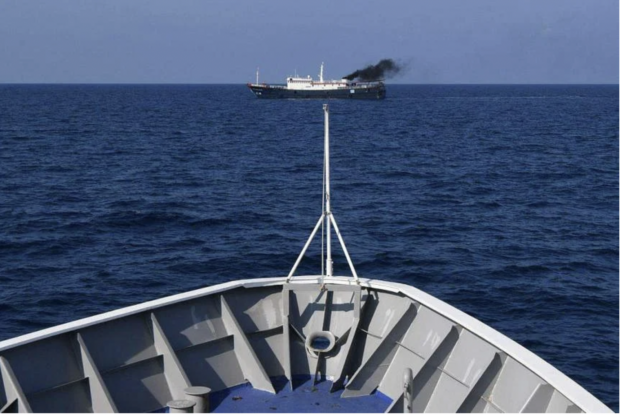
Singapore Defense Minister Ng Eng Hen urged China and Asean to accelerate the conclusion of a substantive code of conduct based on the UN Convention on the Law of the Sea. PHOTO: AFP
SINGAPORE – A war in Asia would be far more devastating than the Ukraine war, and preventing such a physical conflict must be the top priority for all countries in the next decade, said Singapore Minister for Defense Ng Eng Hen on Wednesday.
Such a conflict could have an effect akin to the aftermath of World War I, where four existing empires were decimated and the world map altered for nations and states, he added.
That parties are even contemplating the possibility of such a scenario, parsing war game outcomes and adjusting strategies, shows that there is a need to redouble efforts in diplomacy and conflict prevention and mitigation, he said. The minister also emphasized the need for confidence-building measures and cooperation.
Dr Ng was giving the opening address at the 13th International Maritime Defence Exhibition and Conference Asia, or Imdex Asia, held at Changi Exhibition Centre. The three-day event, usually held annually, returned after a hiatus of four years due to the Covid-19 pandemic.
The minister said the conference, held amid the war in Ukraine and rising tension between the United States and China, provides an important platform to maintain and hopefully enhance regional stability and security.
“Should that calamity ever befall us, whatever the cause and post-hoc justifications, the world as we know it will be radically changed and indeed impoverished – a simultaneous war in Europe and Asia will be disastrous for all of us,” Dr Ng added.
Already, Russia’s invasion of Ukraine has put paid to the hope that deepening economic ties would lead to a shared common prosperity that would reduce the risk of war, he said, adding that the crisis also reversed the interdependencies that countries had built in the past three decades.
“No leader in Europe that I have spoken to today believes that Russia can ever be integrated into Europe, not least within this generation, probably longer. Those hopes have evaporated,” he said.
The most important question is whether the same will be true for Asia and the wider Indo-Pacific region, said Dr Ng.
Unlike in Ukraine, a conflict in Asia, particularly between the US and China, would be unimaginable and would cause manifold times the disruption that the world is now facing, he warned.
Noting the disruptions to energy, wheat, corn, nickel and potash supplies the war in Ukraine has caused, Dr Ng said the US and China together account for more than a quarter of global trade.
As at 2020, Russia accounted for only 2 per cent of global exports, but China, Asia’s largest economic and military power, accounted for nearly 15 per cent of global exports, he added.
With the world dependent on China as a major manufacturer of sundry goods and many essentials, no transnational global challenge can be dealt with without China’s input, the minister said.
Dr Ng cited the example of how China controls around three-quarters of the market for cobalt, lithium and nickel needed in the development of electric car batteries.
“In global financial crises, we recognized and accepted that some institutions, particularly banks and the financial system, were ‘too big to fail’. That phrase applies eminently to the US-China relationship, their relationship with Asean, other Asian countries and Europe,” he said.
Given these developments, it is even more important for those in the defense security arena to take proactive steps to prevent or mitigate conflict in Asia, said Dr Ng, addressing the 47 delegations at the conference, including 22 navy chiefs, coast guard directors-general, and heads of maritime law enforcement agencies.
With 30 per cent of the world’s seaborne trade passing through the South China Sea each year, and one-quarter of global oil trade and one-third of global container trade passing through the Strait of Malacca and Singapore, conflict in the region will have far-reaching implications worldwide, he added.
The minister urged China and Asean to accelerate the conclusion of a substantive code of conduct based on the United Nations Convention on the Law of the Sea, which aims to preserve freedom of navigation while respecting the sovereign claims of individual states.
“That sorely needed agreement has been in the works for over 20 years, since China and Asean first agreed to adopt one in 2002,” he said.
While the Asean Defense Ministers’ Meeting and the grouping’s partners have already established a code for unplanned encounters at sea, as well as guidelines on air military encounters, among other things, more needs to be done to reduce the risks of miscalculations at sea, Dr Ng said.
He suggested that countries should put in mechanisms and frameworks pertaining to coast guard ships, noting that such fleets have grown in the Asia-Pacific region in the past two decades as countries stepped up their frequency of patrols in disputed waters.
Coast guard ships now number more than navy ships, and miscalculations and missteps among them can occur, said Dr Ng.
For instance, in 2020, a Vietnamese fishing boat sank after colliding with a China Coast Guard vessel near the Paracel islands. In 2010, a Japan Coast Guard patrol boat collided with a Chinese fishing trawler in waters near the disputed island chains known as Senkaku Islands to the Japanese or Diaoyu to the Chinese.
Citing these episodes, Dr Ng urged increased collaboration and coordination to ensure such incidents are averted.
He said this is especially urgent in today’s environment of distrust and contestation, as any accidents or incidents could provoke much harsher and protracted responses.
RELATED STORIES